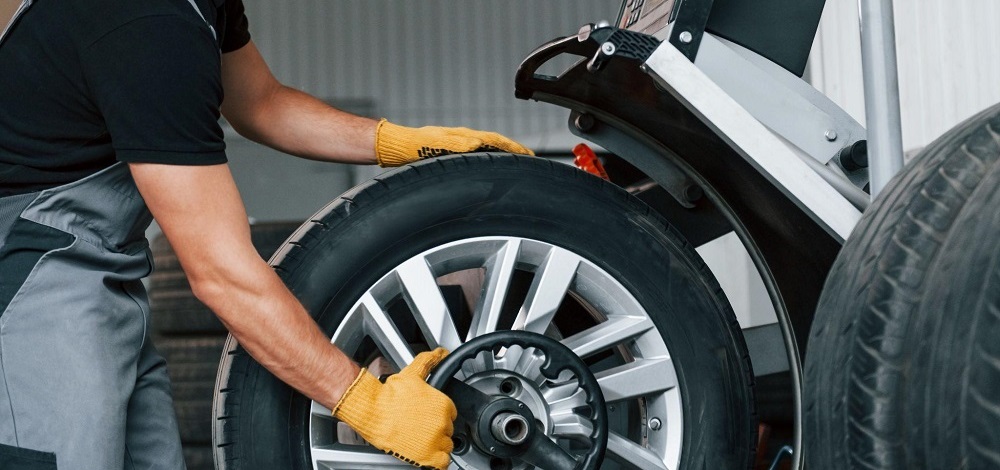Experience Accuracy with GMC Tire Service at Morris Tires
Experience Accuracy with GMC Tire Service at Morris Tires
Blog Article
Tire Solution: The Effect of Climate Condition
When it comes to making certain ideal efficiency and safety on the road, comprehending the effect of weather condition conditions on tire solution is essential. GMC Tire Service. In this discussion, we will certainly explore the intricate partnership between climate conditions and tire solution, losing light on the value of weather-specific tire upkeep practices and factors to consider.
Warm and Tire Performance
When subjected to high temperature levels, tires experience modifications in performance that can dramatically impact car security and handling. The heat created from extended driving or hot weather condition conditions triggers the tire rubber to soften, bring about lowered tread life and enhanced wear. As the rubber becomes softer, the tire's grasp when traveling lessens, influencing braking ranges and total grip. In extreme situations, too much warm can even cause tire blowouts, posturing a severe safety and security danger to the car and its passengers.

Winter Effects
Winter problems can have a significant effect on tire efficiency and safety and security. As temperature levels drop, tire rubber can harden, resulting in decreased grip on icy or snow-covered roads. In winter, tires may also lose atmospheric pressure extra rapidly, which can affect dealing with and fuel effectiveness. In addition, chilly temperature levels can cause tire sidewalls to stiffen, boosting the risk of damage from fractures or other roadway risks.
To minimize the effects of winter on tires, it is crucial to regularly inspect tire pressure and inflate them to the producer's recommended levels. Utilizing winter months or all-season tires designed for winter conditions can likewise boost grip and hold on icy or snowy roadways. Correct tire upkeep, consisting of routine inspections for wear and damages, comes to be a lot more essential during chillier months to make certain optimum performance and security.
Rainy Conditions Influence
Tires with damaged footsteps are more prone to hydroplaning, where a layer of water constructs up in between the tire and the road surface, leading to loss of grip. To battle this, vehicle drivers should consistently check their tires for adequate tread deepness and think about spending in tires especially developed for damp problems.
Moreover, stormy climate can also lower exposure, making it testing for vehicle drivers to see the road in advance clearly (GMC Tire Service). In such conditions, it is vital to adjust driving speeds appropriately and keep a secure following distance to allow for abrupt quits. Correctly filled with air tires can also help in keeping control on damp roads by offering much better handling and hold
Snow and Tire Safety
When driving in snowy conditions, having the ideal tires can make a considerable difference in safety and security and performance. Winter tires are created with unique rubber compounds and walk patterns to provide much better grip on snow and ice contrasted to all-season tires.

It is vital to adhere to producer guidelines when utilizing and installing tire chains to avoid damages to the tires and automobile. By picking the appropriate tires, preserving proper rising cost of living, and taking into consideration additional traction aids like tire chains, vehicle drivers can boost their security when browsing snow-covered roads.
Weather-Related Tire Upkeep
Weather-related tire maintenance includes an array of practices aimed at making sure ideal tire feature and durability in different climate circumstances. One crucial element of weather-related tire maintenance is tire pressure policy. Inspecting tire tread on a regular basis and changing tires when walk wear reaches a particular deepness is vital for keeping traction and stability in damaging weather condition.
Conclusion
Finally, climate conditions have a substantial influence on tire performance and security. From warm impacting tire pressure and use to winter reducing grip, it is necessary to think about the climate when keeping and utilizing tires. Rainy problems can decrease hold and bring about hydroplaning, while snow can raise the danger of crashes if tires are not appropriately equipped. Weather-related tire upkeep is essential in guaranteeing optimum performance and safety when traveling. check
In this discussion, we will certainly discover the complex relationship in between weather conditions and tire solution, losing light on the importance of weather-specific tire upkeep methods and factors to consider.

Report this page